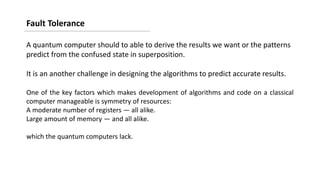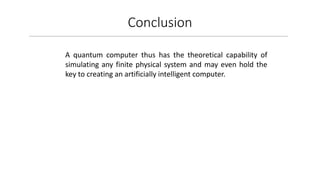An Introduction to Quantum computing
- 1. Quantum Computing Submitted By: Jai Sipani Roll no. : 16/454
- 2. CONTENTS • What is Quantum Computing? • Why Quantum Computing? • Fundamentals of Quantum Computing • Application Areas in Quantum Computing • Limitations in Quantum Computing
- 3. Quantum Computing Quantum computing is an area of computing focused on developing computer technology based on the principles of quantum theory, which explains the behavior of energy and material on the atomic and subatomic levels. During a conference co-hosted by MIT and IBM, Nobel Prize winner Richard Feynman challenges a group of computer scientists to develop a new breed of computers based on quantum physics.
- 4. • Quantum computing is the study of how to use phenomena in quantum physics to create new ways of computing. • The basis of quantum computing is the Qubit. Unlike a normal computer bit, which can be 0 or 1, a Qubit can be either of those, or a superposition of both 0 and 1. Quantum Supremacy? On October 23, 2019 Google announced that it had achieved "Quantum Supremacy," meaning that they had used a quantum computer to quickly solve a problem that a conventional computer would take an impractically long time (thousands of years) to solve.
- 5. • Moore's Law refers to Moore's perception that the number of transistors on a microchip doubles every two years, though the cost of computers is halved. • Transistor cannot be made smaller due to the laws of Quantum mechanics starts to take over (Already at 7nm ). Why Quantum Computing?
- 6. Quantum Bit VS Classical Bit
- 7. Quantum Bits or Qubits Information is stored in quantum bits, or qbits. A qbit can be in states labelled |0} and |1}, but it can also be in a superposition of these states, a|0} + b|1}, where a and b are complex numbers. If we think of the state of a qbit as a vector, then superposition of states is just vector addition. For every extra qbit you get, you can store twice as many numbers. For example, with 3 qbits, you get coefficients for |000}, |001}, |010}, |011}, |100}, |101}, |110} and |111}.
- 8. Fundamentals Of Quantum Computing Superposition Superposition refers to a combination of states we would ordinarily describe independently. To make a classical analogy, if you play two musical notes at once, what you will hear is a superposition of the two notes. An example of a physically observable manifestation of the wave nature of quantum systems is the interference peaks from an e- beam in a double-slit experiment. The pattern is very similar to the one obtained by diffraction of classical waves.
- 9. Entanglement Quantum entanglement is a quantum mechanical phenomenon in which the quantum states of two or more objects have to be described with reference to each other, even though the individual objects may be spatially separated. Entangled particles behave together as a system in ways that cannot be explained using classical logic. For example, it is possible to prepare two particles in a single quantum state such that when one is observed to be spin-up, the other one will always be observed to be spin-down and vice versa
- 10. Interference Finally, quantum states can undergo interference due to a phenomenon known as phase. Quantum interference can be understood similarly to wave interference; when two waves are in phase, their amplitudes add, and when they are out of phase, their amplitudes cancel. Interference effects can be observed with all types of waves, for example, light, radio, acoustic, surface water waves, gravity waves, or matter waves.
- 11. Applications Of Quantum Computing Machine Learning Using quantum systems to train and run machine learning algorithms could allow us to solve complex problems more quickly, potentially improving applications like disease diagnosis, fraud detection, and efficient energy management. In Classical computing, CNN takes upto 2 days to train itself completely. While via Quantum computers it can be done in a few minutes. More computational power can bring enormous change, training and testing petabytes of data in lesser time.
- 12. Materials Simulating quantum mechanical systems is a promising early application of quantum computing. This technique can be applied to fields such as chemistry, materials science, and high energy physics. Learning the size, properties of each and every molecule in making medicines will Be observed easily and quickly via qubits. IBM scientists simulated the bonding in H2, LiH and BeH2 molecules using a quantum computer.
- 13. Finance In the financial service sector, many computationally intensive problems exist, such as optimization of financial portfolios or the risk analysis of such portfolios. For some of these problems, quantum computing may have the potential to achieve a significant advantage compared to classical computing. Learning the size, properties of each and every molecule in making medicines will Be observed easily and quickly via qubits. IBM scientists simulated the bonding in H2, LiH and BeH2 molecules using a quantum computer.
- 14. Cryptography Quantum computers follows probabilistic approach unlike deterministic like classical computing. Using the fundamental of superposition, where it is always uncertainity about the states of bits. We can use it to make private keys which will never be intercepted by hacker. And It does get intercepeted he won’t be able to derive any conclusions from it. RSA Encryption which is the core of encryption schemes applied in real world can be eaily broken by Quantum Computing.
- 15. Teleportation Quantum teleportation provides a mechanism of moving a qubit from one location to another, without having to physically transport the underlying particle that a qubit is normally attached to.
- 16. Limitations in Quantum Computing Scalability Quantum Computers can never be scaled upto classical computers. Even If they were, they won’t be able to sustain much longer. Change in temperature in surrounding may lead them to become error prone. Noise distortion can lead to information corruption. These are still evolving but we won’t be able to use them at a scale of classical computers.
- 17. Decoherence The decoherence theory is reverting a quantum system back to classical through interactions with the environment which decay and eliminate quantum behavior of particles. Due to decoherence qubits are extremely fragile and their ability to stay in superposition and or entangle is severely jeopardized. Radiation, light, sound, vibrations, heat, magnetic fields or even the act of measuring a qubit are all examples of decoherence. Decoherence leads to errors in quantum computational systems where information is lost.
- 18. Fault Tolerance A quantum computer should to able to derive the results we want or the patterns predict from the confused state in superposition. It is an another challenge in designing the algorithms to predict accurate results. One of the key factors which makes development of algorithms and code on a classical computer manageable is symmetry of resources: A moderate number of registers — all alike. Large amount of memory — and all alike. which the quantum computers lack.
- 19. Conclusion A quantum computer thus has the theoretical capability of simulating any finite physical system and may even hold the key to creating an artificially intelligent computer.
- 20. References 1. https://www.cs.virginia.edu/~robins/The_Limits_of_Quantum_Co mputers.pdf 2. https://physics.stackexchange.com/questions/183179/are-there- known-fundamental-limits-of-quantum-computer-scaling 3. https://medium.com/@jackkrupansky/the-greatest-challenges-for- quantum-computing-are-hardware-and-algorithms-c61061fa1210 4. https://hackernoon.com/decoherence-quantum-computers- greatest-obstacle-67c74ae962b6 5. https://www.ibm.com/quantum-computing/learn/what-is- quantum-computing/



















